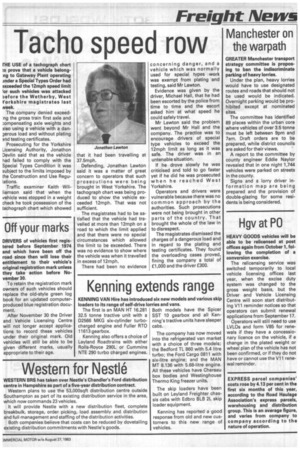Tacho speed row Manchester on
Page 11

If you've noticed an error in this article please click here to report it so we can fix it.
the warpath
rHE USE of a tachograph chart 3) prove that a vehicle belongng to Gateway Plant operating Alder a Special Types Order had 3xceeded the 12mph speed limit or such vehicles was attacked Def or e the Wetherby, West Yorkshire magistrates last Neek.
The company denied exceedng the gross train first axle and -.:ompensating axle weights and 31so using a vehicle with a dangerous load and without plating 3nd testing certificates.
Prosecuting for the Yorkshire Licensing Authority, Jonathon Devlin said that as the vehicle had failed to comply with the Special Types Condition it was subject to the limits imposed by the Construction and Use Regulations.
Traffic examiner Keith Williamson said that when the vehicle was stopped in a weight check he took possession of the tachograph chart which showed that it had been travelling at 37.5mph.
Defending, Jonathan Lawton said it was a matter of great concern to operators that such prosecutions were being brought in West Yorkshire. The tachograph chart was being produced to show the vehicle exceeded 12mph. That was not sufficient.
The magistrates had to be satisfied that the vehicle had travelled at more than 12mph on a road to which the limit applied and that there were no special circumstances which allowed the limit to be exceeded. There was no evidence to show where the vehicle was when it travelled in excess of 12mph.
There had been no evidence concerning danger, and a vehicle which was normally used for special types work was exempt from plating and testing, said Mr Lawton.
Evidence was given by the driver, Michael Hall, that he had been escorted by the police from time to time and the escort asked him at what speed he could safely travel.
Mr Lawton said the problem went beyond Mr Hall and the company. The practice was to encourage drivers of special type vehicles to exceed the 12mph limit as long as it was safe. The driver was in an untenable situation.
If he drove slowly he was criticised and told to go faster yet if he did he was prosecuted when he reached West Yorkshire.
Operators and drivers were vulnerable because there was no common approach by the authorities. Such prosecutions were not being brought in other parts of the country. That brought the whole of the law in to disrespect.
The magistrates dismissed the charges of a dangerous load and in regard to the plating and testing certificates. They found the overloading cases proved, fining the company a total of £1,000 and the driver £300.




























































































































